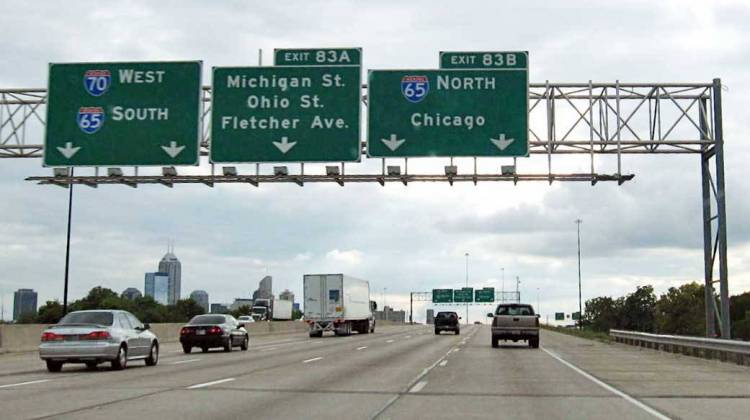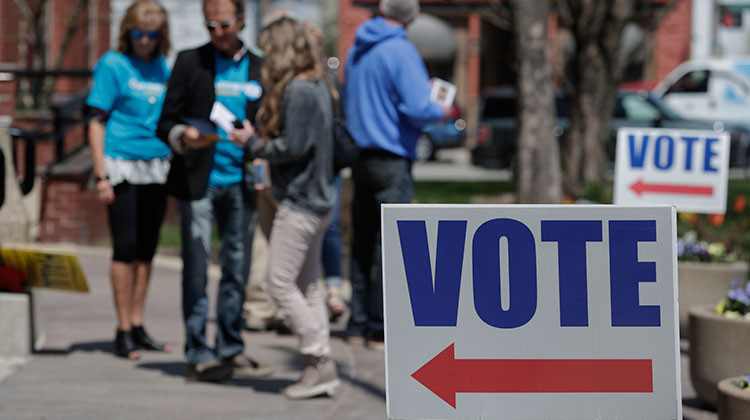Indiana lawmakers are considering whether to shift the state’s funding for roads and highways from a system based on gas purchases to one based on miles traveled.
Currently, Indiana drivers pay an 18-cent per gallon tax on gasoline, which is the state’s top transportation funding source, outside federal funds. But experts told a legislative committee Wednesday that the state should consider requiring at least some drivers to pay a road usage fee instead.
That’s because as cars have become more fuel efficient, gas tax funding has remained stagnate or fallen – even as the cost of road construction has increased. The problem is expected to worsen under higher gas mileage requirements mandated by the federal government.
“We have a problem that is an ever increasing spiral,” said Republican Rep. Ed Soliday of Valparaiso, the chairman of the Joint Study Committee on Transportation and Infrastructure Assessment and Solutions. “Things are not going to get better.”
And Congress is facing a similar problem with the federal gas tax, which provides most of its transportation funding. That means the states can’t wait for help from the federal government, Soliday said.
“We have to look at alternative ways for everyone to pay for their fair share,” he said.
But auto industry leaders told the joint committee on Wednesday that any new system shouldn’t punish people who choose to buy hybrid or electric vehicles.
“We’re fine with paying our fair share as long as it’s technology neutral and comprehensive,” said Genevieve Cullen, vice president of the Electric Drive Transportation Association.
Lawmakers briefly considered legislation last year that would have imposed a $100 fee on the owners of electric vehicles, an amount Soliday said was based on the average amount that Hoosier drivers pay in state gas taxes. That plan was scrapped in favor of a study this fall to consider funding alternatives.
Jeff Perry, regional director of state government relations for General Motors, said policy makers too often blame the technology for transportation funding issues, even though improvements in gas mileage are more responsible for shortfalls. He said fees imposed on the owners of electric cars or hybrids – which combine gas and electric motors – discriminate against people who are choosing a vehicle that is better for the environment and the country.
Perry also said the fees aren’t fair because some larger hybrid vehicles have lower per-gallon mileage than do efficient gasoline-only powered cars.
“The problem is that the (gas tax) model is flawed,” Perry said. “We need a ground up approach, not just patches.”
One alternative is a road usage fee, which involves charging vehicle owners based on how many miles they drive. It’s a system that could be implemented in addition to the existing gas tax or in place of it, supporters said.
Oregon is implementing that type of system and officials in Washington and Nevada are considering something similar, said Matthew Dorfman, a partner at D’Artagnan Consulting, which works with states on transportation issues.
He called the road usage fee “almost the inevitable option.”
The system can involve installing monitoring devices in vehicles – but must also include the ability for drivers to report their mileage manually to avoid concerns about privacy, he said.
“There is no mandate for a GPS. There is no black box,” he said. “There should be some form of user choice.”
Denvil Duncan, a professor at the Indiana University School of Public and Environmental Affairs, told lawmakers that he’s conducted surveys showing that Americans are open to the change – but only if they can see that it will eventually replace the gas tax. They don’t want to pay both, he said.
Drivers were also concerned about private issues, especially for programs that would use a GPS tracker in their vehicles. But Duncan said drivers were more supportive of self-reporting options.
Cost is also a factor, he said.
“So if you decide to go with a GPS model, the question becomes who will pay for the GPS device – the government or the driver,” Duncan said. “We’re seeing this does make a difference. If I don’t have to pay for it, I’m more likely to support it.”
Lesley Weidenbener is managing editor of TheStatehouseFile.com, a news website powered by Franklin College journalism students.
 DONATE
DONATE








 Support WFYI. We can't do it without you.
Support WFYI. We can't do it without you.